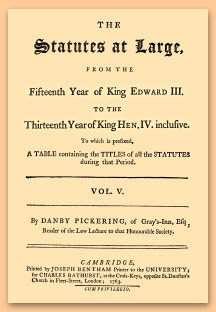|
|
Henry VI (Dec. 6, 1421 - May 21/22 1471) ascended the throne of England on September 1, 1422 and that of France on October 21, 1422, ruling from 1437. As part of a long series of laws known as the Statutes of Laborers, he attempted to control the wages and working conditions of all the trades. In practice, stonemasons, viewing themselves as under the protection of the Pope, generally ignored these statutes.
Elizabeth I (Sept. 7, 1533 -March 23, 1603), ascended the throne in 1558. The Statutes of Laborers, accumulating from the time of Edward III (Nov. 13, 1312 -June 21, 1377) were codified by 5 Elizabeth., c. iv., explained and extended by the 39 Eliz., c. xii.; 4 Eliz., c. ix.; James I., c. vi.; and 21 James I., c. xxviii. Repealed by the 54 Geo. III., c. 96. [Mackey’s History, vol 1, p. 376.]
|
|
|
|
Statutes of King Henry VI of England
The Statutes of Henry VI have been occasionally cited by anti-masons, and historians, as an example of the suppression of Freemasonry. This claim was first made by Dr. Plot in his Natural History of Staffordshire. In context the statute only prohibited annual gatherings as a "trade union busting" tactic, and had nothing to do with what would later become Freemasonry.
|

Titlepage.
|
Anno tertio H
ENRICI VI.
Statutes made at Westminster, Anno 3 H
EN. VI and Anno Dom. 1423.
Our lord the King, by the advise and assent of the lords spiritual and temporal, and at the special request of the commons, assembled in this parliament, holden at Westminster the last day of April, the third year of his reign, hath ordained and established certain ordinance and statutes, to the honour of G
OD and for the weal of his realm, in the form following. |
| [p. 94.]
|
|
|
Anno tertio HENRICI
VI. [1424.
CAP. I.
Masons shall not confederate themselves into chapiters and assemblies.
|
|
F IRST, whereas by the yearly congregations and confederacies made by the masons in their general chapiters and assemblies, the good course and effect of the statutes of labourers be openly violated and broken, in subversion of the law, and to the great damage of all the commons ; (2) our said lord the King willing in this case to provide remedy by the advice and assent aforesaid, and at the special request of the said commons, hath ordained and established, That such chapiters and congregations shall not be hereafter holden, (3) if they thereof be convict, shall be judged for felons. (4) And that all the other masons that come to such chapiters and congregations, be punished by imprisonment of their bodies, and make fine and ransome at the King’s will. [p. 95]
Excerpts faithfully transcribed from THE Statutes at Large, FROM THE Fifteenth Year of King Edward III. TO THE Thirteenth Year of King Hen. IV. inclusive. To which is prefixed, A TABLE containing the TITLES of all the STATUTES during that Period., VOL. II., By DANBY PICKERING, of Gray’s-Inn, Esq; Reader of the Law Lecture to that Honourable Society. CAMBRIDGE, Printed by JOSEPH BENTHAM Printer to the UNIVERSITY; for CHARLES BATHURST, at the Cross-Keys, opposite St. Dunstan’s Church in Fleet-Street, London; 1762. CUM PRIVILEGIO.
from a copy in the Law Library of the British Columbia Court House, Vancouver. Note that the long "s" has been converted to conventional usage. Page numbers noted in brackets.
|
|